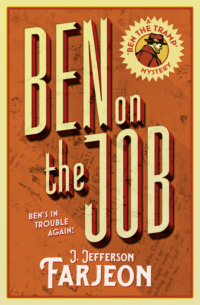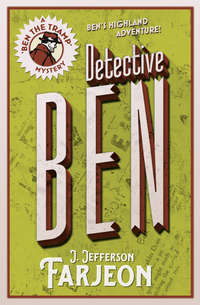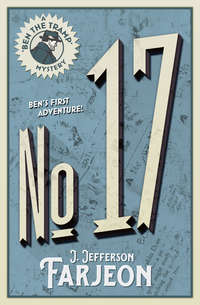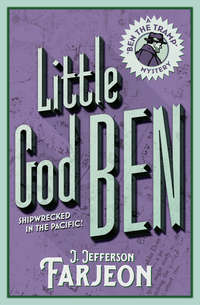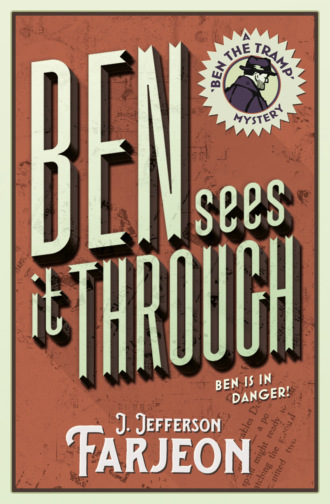
Полная версия
Ben Sees It Through
‘I suppose he is coming back?’ he frowned.
‘I s’pose ’e is,’ replied Ben.
‘Suppose he don’t?’ said the taximan.
‘Then ’e won’t,’ answered Ben.
The taximan’s frown grew, and focused itself directly on Ben.
‘I’m going to get my fare,’ he declared, with a hint of a threat.
‘That’s orl right,’ nodded Ben. ‘I’ll sendjer a cheque.’
During the next three minutes the young man returned, and a crisis was averted. He gave an instruction to the driver, entered the taxi, and the journey was resumed.
‘We thort we’d lorst yer,’ said Ben.
‘I had to go to another shop,’ explained the young man, with no trace of apology, ‘and while I was there I met a friend.’
‘I see. And ’ad one,’ replied Ben. ‘And where are we goin’ now?’
‘To the station.’
Ben opened his eyes wide.
‘Wot for?’ he demanded.
‘For the job,’ answered the young man. ‘There’s a train at 6.22, and you can just catch it.’
‘Me?’
‘You!’
‘Yus, but—’ Ben paused. There was a rather disturbing sense in all this of being shoved about. ‘Ain’t you goin’, too?’
‘Never mind about me. Now, listen. The train goes at 6.22, and gets into London in a couple of hours. Waterloo. Do you know Waterloo? Your peculiarly pleasant accent suggests a knowledge of London. I hope you know your way about?’
‘Wot! Lunnon?’
‘Even so. Lunnon.’
‘Without me,’ said Ben, ‘Lunnon ain’t Lunnon.’
‘Really! One of the sights?’
‘Didn’t yer know? When them Americans come hover, if I ain’t there they turns rahnd and goes back agine.’
‘Upon my soul, I’m honoured to have met you!’ laughed the young man, and Ben found himself counting his teeth. ‘I hope, in the circumstances, you won’t feel above travelling third-class?’
‘Well—jest fer once, like.’
‘Splendid! Now, listen again. All this is very entertaining, but we mustn’t forget that life’s a serious matter—and especially,’ he added significantly, ‘when we’re job-hunting. The fare to Waterloo is nine-and-tenpence. From Waterloo you will have to get to Wimbledon. Do you know Wimbledon?’
‘That’s right,’ nodded Ben. ‘That’s where Tilden and me ’as our little knock-up.’
A slight frown appeared on the young man’s face.
‘I wonder,’ he mused, gravely, ‘whether, after all, you have too much humour for this job?’
‘Don’t you worry, sir,’ Ben stuck to him. ‘If it’s wanted, I can cry like I got a fly in me eye.’
The young man weighed the information. He did not seem to find it immediately convincing. He studied Ben with a new interest and attention, and Ben felt that his fate was being decided. It was. The toss went against him, and the young man smiled again.
‘Yes—after all, I think you’ll do,’ he said, ‘although I’m afraid there won’t be any tennis for you. The house you’re going to is at Wimbledon Common. Are you good at remembering names?’
‘Yus,’ answered Ben. ‘I can remember ’arf me own.’
‘Yes, by the way, what is it?’
‘Ben.’
‘And you’ve forgotten the other half?’
‘Yus.’
‘Conveniently?’
‘Wotchermean?’
‘Oh, nothing. But sometimes people make a habit of forgetting their names. Well, so you won’t forget this one—’
‘Oo?’
‘—the name of the house you’ve got to go to—’
‘Oh.’
‘Please don’t keep on saying “Oo” and “Oh.” It’s getting a bit on my nerves. So you won’t forget the name of the house you’re going to, I’ll write it down on a piece of paper, and you can stick it in your pocket. I suppose,’ he added, looking at Ben’s ragged suit, ‘you’ve got a pocket?’
‘You can put anythink in me anywhere,’ Ben told him.
‘Well, find a place where this will stay in,’ replied the young man, as he took out a note-book.
He tore out a sheet and scribbled upon it. Then he handed it to Ben and asked whether he could read it.
‘Corse I can!’ retorted Ben, and held the paper hard against his best eye. ‘“Greystones,” ain’t it?’
‘Splendid! Go on.’
‘“Greystones,”’ repeated Ben, to gain time. ‘And the next is “North Lane.” But where’s the Common?’
‘No need to write that,’ responded the young man. ‘You can remember Wimbledon Common, can’t you? And if you lost that little piece of paper with the complete address on it, somebody else might find it and go after your job.’
‘So they might,’ murmured Ben, impressed.
‘Now, I’m going to give you a pound,’ proceeded the young man, ‘and that will cover your expenses all the way.’
It would more than cover them. Ben kept very still, lest his companion should realise it.
‘When you get to the house,’ went on the young man, ‘you will say that—Mr White sent you—’
‘I’m bein’ you, like?’
‘—and you will hand over the piece of paper with the address on.’
‘Yus, but ’oo—’
‘I’m coming to that, now. The gentleman you will ask for, and hand the paper to, is Mr Lovelace—’
‘Go on!’
‘What’s the matter now?’
‘Nothink!’
‘Then what did you say “Go on” for?’
‘Well—Lovelice! I thort you was makin’ the nime hup, like.’
‘Try to think a little less when you get to Wimbledon Common,’ said the young man dryly. ‘If Mr Lovelace can stand your interruption and likes your face, he’ll take you. If he can’t and doesn’t—’ The young man shrugged his shoulders. ‘Well, in that case you’ll have had your fare to London, with a bob or two over.’
The taxi swung round a corner. A hundred yards ahead loomed the station.
‘And that’s orl?’ murmured Ben.
‘Yes—when I’ve given you your cap,’ answered the young man.
He undid the little parcel. A dark brown cap of rough material bulged out of it.
‘Have I suited your particular style of beauty?’ asked the young man, as he put it on Ben’s head.
Ben stared at a small mirror fixed in the taxi. The young man stared at Ben. Both were intent.
‘Bit of orl right,’ commented Ben.
‘Good,’ said the young man. He looked pleased. Then all at once he looked less pleased, for a blank expression suddenly replaced the self-conscious grin with which Ben had been regarding his face in the mirror. ‘What’s the trouble this time?’ he demanded, sharply.
‘Jest thort o’ somethink,’ muttered Ben.
‘I advised you not to think,’ retorted the young man.
‘Yus, but—well, this is somethink I fergot, see?’
‘All I see is that you’ll have to go on forgetting it!’
And, as though to clinch matters and to end wavering, the young man whipped out his case and handed Ben the promised pound-note.
Ben clutched the note, but his soul was not soothed. The thing he had forgotten was important. More important, even, than a pound-note.
‘It’s a letter,’ said Ben.
‘Write it from London,’ answered the young man.
‘That might be too late, see,’ replied Ben, doggedly. ‘It might miss the person.’
‘Who is the person?’ asked the young man.
Ben hesitated. He didn’t feel inclined to admit that the person was a girl he had left in Spain, who wouldn’t know where to connect up with him when she got back to England unless she found a note waiting for her at Southampton Post Office. Such an admission, besides treading on sacred ground, would reinforce the young man’s proposal that the note should be sent from London, since it was hardly likely that Molly Smith would reach Southampton hot upon Ben’s heels.
‘Yus, but she might,’ reflected Ben, ‘and I ain’t takin’ no charnces! Lunnon’s a long way orf, and while I’m ’ere I’m ’ere!’
So he told the young man that the person was a bloke wot owed him a fiver and that he wasn’t going to waste no time in getting after it.
This story, coupled with the queer doggedness by which Ben occasionally got his way at unexpected moments, produced a halt of two minutes outside a small stationer’s shop. In these two minutes, while the young man waited in the taxi, Ben bought a sheet of paper and an envelope and a penny-halfpenny stamp, borrowed a pen, wrote: ‘Dere Molly i’m ere graystones north lane wimbledon Common,’ stuffed it in the envelope, addressed it to ‘Miss Molly Smith, Post Orfis, Southamton,’ thumped on the stamp, and posted the lot in a pillar-box.
‘’Ow’s that fer quick?’ he exclaimed, as he got back into the taxi.
The young man made no reply.
‘Oi! I ses ’ow’s that fer quick?’ repeated Ben.
The young man still made no reply. Suddenly, Ben looked at him.
As a rule, Ben moved slowly. His motto was that you never got nowhere, so why ’urry? But, at chosen moments, he moved with a rapidity that baffled logic. He could get down three flights of stairs in two seconds, and round two corners in one. He had never got down stairs or round corners, however, with half the rapidity at which he now got out of the taxi. The driver was still in first gear, driving a dead man to a station, while Ben was legging it four blocks away.
And on Ben’s head was a cap, and in his pocket was a pound-note, which the dead man had given him.
‘Now, you!’ exclaimed a voice in his ear.
A hand grabbed his coat. With a yelp, he wrenched himself free. And, as he did so, he wondered why Fate never gave him a decent deal, and why the hand he had wrenched himself away from was not an ordinary hand, but bore a livid red scar.
Конец ознакомительного фрагмента.
Текст предоставлен ООО «ЛитРес».
Прочитайте эту книгу целиком, купив полную легальную версию на ЛитРес.
Безопасно оплатить книгу можно банковской картой Visa, MasterCard, Maestro, со счета мобильного телефона, с платежного терминала, в салоне МТС или Связной, через PayPal, WebMoney, Яндекс.Деньги, QIWI Кошелек, бонусными картами или другим удобным Вам способом.




